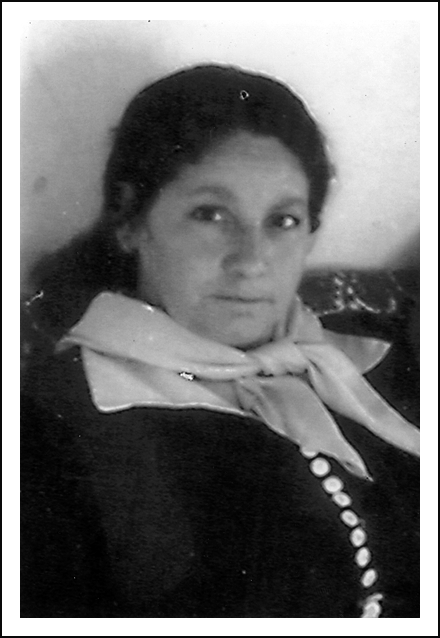
Umm Hussein. Bourj al Barajneh camp, 1973.
Photo: Rosemary Sayigh
|

Umm Hussein. Bourj al Barajneh camp, 1973. Photo: Rosemary Sayigh |
|
Al-Bassa, where he had spent much of his childhood, and of his much-loved mother, whose face in the photo, with her husband and seven children, taken a few years before the Nakba, used to attract my gaze on visits to the family home.
Bourj al-Barajneh camp: Umm Hussein In 1973 I began visiting Bourj al-Barajneh camp, near the Beirut airport, with a population at the time of about five thousand. It was Ahmad Saleh who first introduced me to Bourj. Ahmad worked in a Palestinian information office in West Beirut where I was a volunteer, established to assist journalists and political tourists. His father occupied an extended home in 'hayy' Kweikat, along with two married sons and their families, as well as unmarried sons and daughters. Abu Saleh, Ahmad's father, once told that he had more than thirty grand children, and that if he came across them in the street, he wouldn't always know them. Ahmad took me across the alley to meet Umm Hussein, his older sister. She was a widow whose husband's early death had left her with six young children to raise, four daughters and two sons. Because her husband had been a teacher, her home was a bit more spacious than most others; I was able to share a separate bedroom there with her two teen-age daughters, Amal and Asma. For nearly two years I stayed on and off with Umm Hussein, getting to know most of the families in 'hayy' Kweikat. During that time, Ahmad, the gentle lad who had managed my 'entry' to Bourj, died by his own hand after his young nephew shot himself while playing with Ahmad's Klashinkov. Such tragedies were not uncommon at that time, written off as the cost of armed struggle, but also evidence of the difficulty of having to train for resistance from heavily populated camps - conditions very different from most national liberation struggles that have some territory of their own, however controlled, in which to organize. Bourj camp had been originally settled through an agreement between land-owning families of the neighbourhood, and refugee notables from al-Kabri in Galilee. A sandy hill between the |
township and the coastal plain was allotted to the refugees for a stay that everyone believed then to be temporary. The area was divided out between the people of six or seven neighbouring villages in the district of Akka -- al-Kabri, Tarsheeha, Kweikat, Sheikh Dahood, al-Ghabsiyyeh, Shaab, and Zeeb. When I began staying there village origins and boundaries were still clearly marked in daily life language.4 Palestinian researcher Nabil Badran called it the most authentically rural of all the camps in Lebanon. It also had the highest per capita number of PhDs, a sign of the value that refugees of peasant origin set on education. It also indicated the closure of professional and skilled technical employment to the refugees in Lebanon.
My first idea for an MA thesis was to do a study of the upbringing of Palestinian children. This idea was based on the 'culture and personality' readings I had been doing at the university, and on the fallacious notion that upbringing might somehow be linked to the 'defeat' of 1948. I spent a lot of time at the beginning observing children's games, photographing them, and questioning parents - of course mainly mothers. As I read more history, I began to realize that the idea of a connection between rural ways of child-raising and the expulsions from Palestine, or the refugee crisis, was absurd. Umm Hussein dealt the final blow to my focus on 'socialization' - as it was called in social science terminology -- by saying, "What kind of upbringing can we give them in a place like this?" For her - and the others - the word itself - 'terbiya' -- had moral and social connotations that made its use in a refugee camp context not just ridiculous but painful. Such a question could only remind people of the degraded conditions in which they and their children had to live; it would be a blow to the most sensitive spot of the parental psyche. Forced to change topics, I switched to recording experiences through which a cross section of Bourj Barajneh residents had first become aware of their identity as Palestinians. It was a different approach to 'socialization'.5 Umm Hussein was my main teacher in Bourj al-Barajneh, just as Umm Joseph had been in Dbeyeh. She had been married at a very young age to the only |
|
4. Studies of Bourj Barajneh camp include Jalloul 1994; Roberts 1999: Sorvig 2001. There have also been several films about this camp. |
|
5. The MA thesis was later amplified and published (Sayigh 1979). |
|
Copyright©2005 |
|